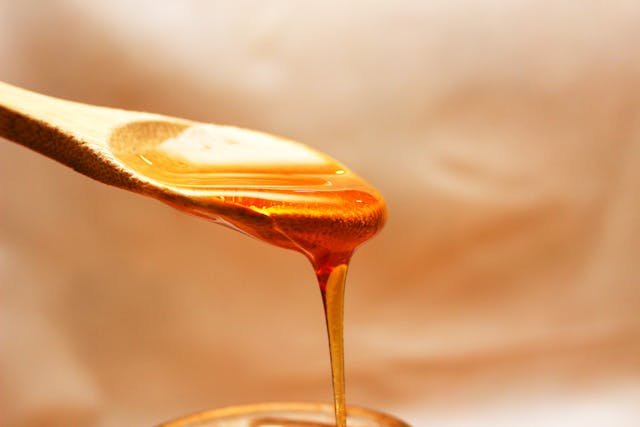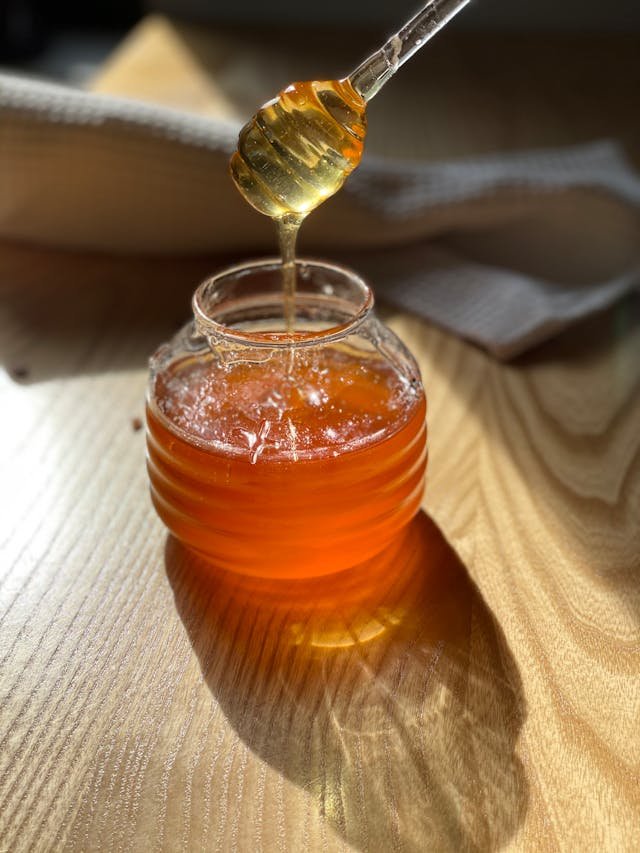Honey – that golden, sweet nectar that has been cherished since ancient times. From soothing sore throats to sweetening our tea, honey plays a vital role in many households. But how much we really know about it? Is it the miraculous taste it’s often made out to be, or just another kind of sugary treat? Welcome to our deep dive into the world of honey, where we’ll separate fact from fiction and uncover the truth behind some of the most common myths.
In this article, you’ll discover:
Common myths revealed: We’ll tackle popular misconceptions, such as the idea that honey never expires and that it’s just another form of sugar.
Fascinating Facts Exposed: Learn about the real nutritional benefits of honey, its variety of types, and its medicinal properties backed by science.
Practical Insights: Get tips on how to store honey properly, understand its impact on health conditions like diabetes, and much more.
Whether you’re a long-time honey lover or a curious newcomer, this guide will give you the insights you need to appreciate honey’s true nature. So, grab a cup of tea – perhaps sweetened with a little honey – and join us as we explore the sweet truths and sticky myths about one of nature’s most beloved treasures.
Common Myths About Honey
Honey never expires.
Myth: Honey lasts forever and never goes bad.
Reality Check: While honey is known for its long shelf life due to its low moisture content and acidic pH, it can crystallize and change in texture over time. But don’t worry, crystallized honey is still safe to eat!
All honey is the same.
Myth: All honey is created equal.
Reality Check: Honey comes in various types, each with unique properties. Manuka honey, for instance, is celebrated for its antibacterial properties, while wildflower honey is often milder in flavor.
Honey is just sugar.
Myth: Honey is no different from regular sugar.
Reality Check: Honey contains vitamins, minerals, and antioxidants that provide health benefits beyond those of plain sugar. It’s not just about the sweetness; it’s about the nourishment.
The Real Facts About Honey
Honey’s Shelf Life
Honey can last indefinitely if stored properly. Its natural properties prevent bacterial growth, making it a fantastic natural preservative.
Varieties of Honey
From acacia to buckwheat, the variety of honey types is immense. Each type offers distinct flavors and health benefits, making honey a versatile ingredient.
Nutritional Benefits of Honey
Honey is rich in antioxidants, which help combat free radicals in the body. It also has trace amounts of vitamins and minerals that contribute to overall health.
Myth: Honey is Good for Diabetics
Myth: Diabetics can safely consume honey as a sugar substitute.
Reality Check: While honey has a lower glycemic index than sugar, it still affects blood sugar levels. Diabetics should consume it with caution and consult their healthcare provider.
Fact: Honey Contains Antioxidants
Honey is loaded with antioxidants like phenols and flavonoids, which can help reduce the risk of heart disease and support overall health.
Myth: Honey Causes Allergies
Myth: Consuming honey will trigger allergies in people with pollen sensitivities.
Reality Check: While rare, some individuals might react to pollen in honey. However, many people consume local honey to build resistance to local pollen allergies.
Fact: Honey Has Medicinal Properties
Honey has been used for centuries as a natural remedy. Its antibacterial and anti-inflammatory properties make it effective for treating wounds and burns.
Myth: Honey is Vegan
Myth: Honey is a vegan-friendly food.
Reality Check: Since honey is produced by bees, it is not considered vegan. Many vegans avoid honey to prevent the exploitation of bees.
Fact: Honey Can Soothe Sore Throats
A spoonful of honey can do wonders for a sore throat. Its soothing properties help reduce irritation and its antibacterial qualities can aid in healing.
Myth: You Can Substitute Honey for Sugar in Baking
Myth: You can directly replace sugar with honey in any baking recipe.
Reality Check: Honey is sweeter and more liquid than sugar, which can alter the texture and moisture of baked goods. Adjustments in measurements and other ingredients are often necessary.
Fact: Raw Honey vs. Processed Honey
Raw honey is unprocessed and retains more of its natural nutrients and antioxidants. Processed honey, on the other hand, may lose some of these benefits due to heating and filtration.
Myth: Honey is Always Organic
Myth: All honey is organic.
Reality Check: Not all honey is organic. Organic honey must meet specific standards, including the source of the nectar and the treatment of the bees.
Fact: Honey Can Improve Skin Health
Honey’s moisturizing and antibacterial properties make it a popular ingredient in skincare. It can help treat acne, hydrate the skin, and promote healing.
Conclusion
Honey is more than just a sweet treat. Throughout this article, we’ve explored the common myths and real facts about honey. We’ve learned that honey doesn’t last forever, it’s not the same as sugar, and it comes in many different types with unique benefits.
We also discovered that honey has real nutritional value, contains antioxidants, and has medicinal properties that can help with sore throats and wounds. But remember, while honey has many benefits, it’s important to use it in moderation, especially for those with health conditions like diabetes.
In the end, understanding the truths about honey helps us appreciate it even more. So next time you drizzle honey on your toast or stir it into your tea, you’ll know exactly why this golden nectar is so special. Enjoy your honey wisely and savor its many wonderful properties!
Frequently Asked Questions (FAQs)
1. Is crystallized honey safe to eat?
Yes, crystallized honey is safe to eat. Simply warm it up to return it to its liquid state.
2. Can infants eat honey?
No, infants under one year should not consume honey due to the risk of botulism.
3. How should I store honey?
Store honey in a cool, dry place in a tightly sealed container to prevent crystallization and contamination.
4. What is the difference between raw and processed honey?
Raw honey is unprocessed and retains more nutrients and antioxidants. Processed honey has been heated and filtered, which may reduce its nutritional value.
5. Can honey help with weight loss?
While honey contains more nutrients than sugar, it is still high in calories and should be consumed in moderation as part of a balanced diet.
________________________________________
Enjoy your sweet journey into the world of honey!



